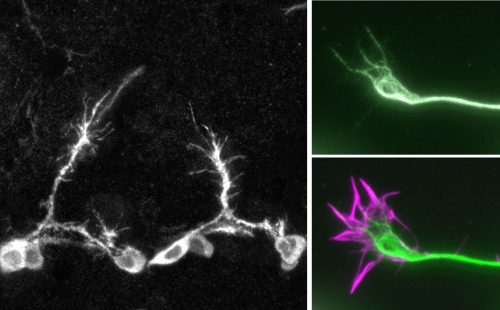PhD DTP opportunity: Cell Biology, Univ. Manchester
Posted by Andreas Prokop, on 11 November 2019
Closing Date: 15 March 2021
Definition of integrin signalling networks underlying neuron growth in vivo
 Cell adhesion molecules (CAMs) of the plasma membrane physically tie cells together into tissues, both via interaction of cells with other cells or with ECM (extracellular matrix); they also constitute hubs of information exchange with neighbouring cells and the environment. CAMs mediate a broad range of biological functions and their aberration contributes to a range of diseases, such as cancer progression or aberrant growth/regeneration of nerves.
Cell adhesion molecules (CAMs) of the plasma membrane physically tie cells together into tissues, both via interaction of cells with other cells or with ECM (extracellular matrix); they also constitute hubs of information exchange with neighbouring cells and the environment. CAMs mediate a broad range of biological functions and their aberration contributes to a range of diseases, such as cancer progression or aberrant growth/regeneration of nerves.
On this project, you will study integrins, which are the major adhesion receptor class for extracellular matrices.Integrin signalling is performed by its adhesome, the dynamic population of proteins that link integrins both to the cytoskeleton and to signalling pathways via the cytoplasmic tails of the receptors. The composition and functional state of integrin-associated complexes essentially determines the adhesion state and signalling output.
To understand this, Martin Humphries has long-standing expertise in using proteomics based on mass spectrometry as a means to identify components of the integrin adhesome and study their function in mammalian cell culture [1]. On this project, you will extend such approaches to brain tissues in the living organism and study the function of identified proteins in the context of nerve growth.
For this, you will capitalise on the expertise of Andreas Prokop, who uses neurons of the fruit fly Drosophila to study mechanisms of nerve growth [2]. In this functional context, his team discovered and analysed important roles of integrins and some of their conventional adhesome components (new unpublished results). The small size and genetic tractability of Drosophila makes it feasible to perform proteomics on integrin adhesion complexes extracted from nerve cells of living organisms.
Once candidate components have been identified, you will then be able to capitalise on highly efficient genetic means provided by Drosophila to study their functional contributions during nerve growth [2] – potentially identifying promising drug targets for nerve regeneration therapies. A likely option will be the extension of such functional studies into mammalian models.
Your experimental skill training opportunities will include molecular biology, protein biochemistry, mass spectrometry, genetics, cell biology, a range of imaging techniques, bioinformatics, as well as insights into important concepts of the cell and neurobiology fields. In addition, AP is an expert in science communication providing further training opportunities important for your career development.
[1] Horton, E.R., et al. (2015) Nature Cell Biol. 17: 1577-1587.
[2] Prokop, A., et al. (2013) J. Cell Sci. 126: 2331-2341.


 (No Ratings Yet)
(No Ratings Yet)